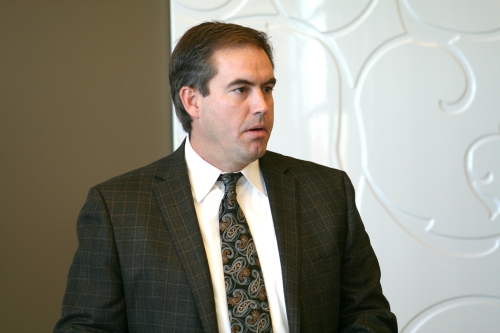




Methodist Women's Hospital Announces $19.3 Million NICU Expansion Project
Published: Nov. 12, 2015OMAHA – In 2015, Methodist Women’s Hospital will care for well over 600 babies in their Neonatal Intensive Care Unit and with 28 private beds currently available, the unit has been beyond capacity nearly 93 percent of the year.
The demand and the desire to offer high-quality neonatal care to more families in the region ignited an effort several months ago to expand the current NICU space to 51 private beds and also provide a private family lounge for parents to relax and rest during their baby’s stay.
The announcement was made earlier today with Methodist Health System leadership, physicians, medical staff and NICU families present.
 “When we opened this hospital five years ago, we anticipated growth to occur and we actually have exceeded our expectations,” said Sue Korth, COO and vice president of Methodist Women’s Hospital. “We are on target for nearly 5,500 babies in 2015, many of which need NICU care. In addition we have the largest group of doctors who specialize in high-risk pregnancies. With those kinds of numbers you can see why capacity can be an issue for us.”
“When we opened this hospital five years ago, we anticipated growth to occur and we actually have exceeded our expectations,” said Sue Korth, COO and vice president of Methodist Women’s Hospital. “We are on target for nearly 5,500 babies in 2015, many of which need NICU care. In addition we have the largest group of doctors who specialize in high-risk pregnancies. With those kinds of numbers you can see why capacity can be an issue for us.”
The room expansion will include 13 single rooms and five rooms for twins or triplets. All babies in the new expanded space will be closely watched with the HeRO Monitoring System, which has already been implemented in the existing NICU.
In October Methodist Women’s Hospital became just the 29th hospital in the world to offer the HeRO Monitoring System and the only hospital in the Midwest. The HeRO Monitoring System is an innovative tool that tracks the beat to beat variability of a baby’s heart.
 “That variability gives us advanced warning of infection or illness – in most cases - before any symptoms appear,” said Dr. David Minderman, medical director of the NICU. “By closely monitoring the HeRO data our team can be alerted to changes in babies’ conditions, resulting in extra monitoring and a more proactive approach to their care.”
“That variability gives us advanced warning of infection or illness – in most cases - before any symptoms appear,” said Dr. David Minderman, medical director of the NICU. “By closely monitoring the HeRO data our team can be alerted to changes in babies’ conditions, resulting in extra monitoring and a more proactive approach to their care.”
In other hospitals where this technology has been implemented infant mortality rates have been reduced by 20 percent.
Dr. Minderman also cited the expansion is a plus for families for another reason – more private space for each baby.
“Every family whose child needs to be cared for in our NICU will have their own private room,” Dr. Minderman said. “That privacy is important for many reasons – but most importantly it allows us to control the environment for each baby which is vital. Research clearly shows that the smallest NICU babies do the best when they are in private rooms.”
At a cost of $19.3 million, the NICU expansion was launched through generous donations from the Omaha community. The Methodist Hospital Foundation was tasked with raising 70 percent of those project dollars before construction could begin – they have surpassed that – with nearly $18 million raised to date.
“As you’ve heard, the need for more NICU beds is real and urgent,” said Cyndy Peacock, president and CEO of the Methodist Hospital Foundation. “This expansion will meet a growing need in the region. I am thankful Methodist Hospital Foundation donors quickly responded to this critical situation. They truly opened their hearts to our tiniest and most vulnerable patients.”
Peacock also announced the public donation component of the project has launched, with the hope the Omaha community will also respond to the need.
“We hope those who have received care in our NICU might join us,” Peacock said. “Or a grateful grandparent or even a family who’s had a healthy child and wants to pay it forward. This NICU impacts our entire community and together we can reach this goal.”
One of those families who know full well the impact of the NICU were the Matsons. Allison and Aaron and their two sons, Owen and Joel, spent a total of 106 days in the NICU. Those days were challenging, but they were very grateful for the care provided by the medical team at Methodist Women’s Hospital.
“It’s very overwhelming to see the people we consider family in this room here today,” Allison Matson said. “When we found out we were pregnant with twins it was scary and we weren’t sure it would become reality. I was diagnosed with preeclampsia and at 29 weeks the boys were delivered. I have heard from other patients the impact their care providers have had on their lives. The people in this room had tremendous impact on our lives and will for many years to come. They made us feel a part of the care team from the very beginning. This hospital means the world to us.”
Construction on the NICU expansion will begin in December, with an 18 month construction timeline. Throughout the construction special precautions will be taken to reduce noise and vibration, as the NICU will remain fully operational, and our patients are extremely sensitive to those issues.

